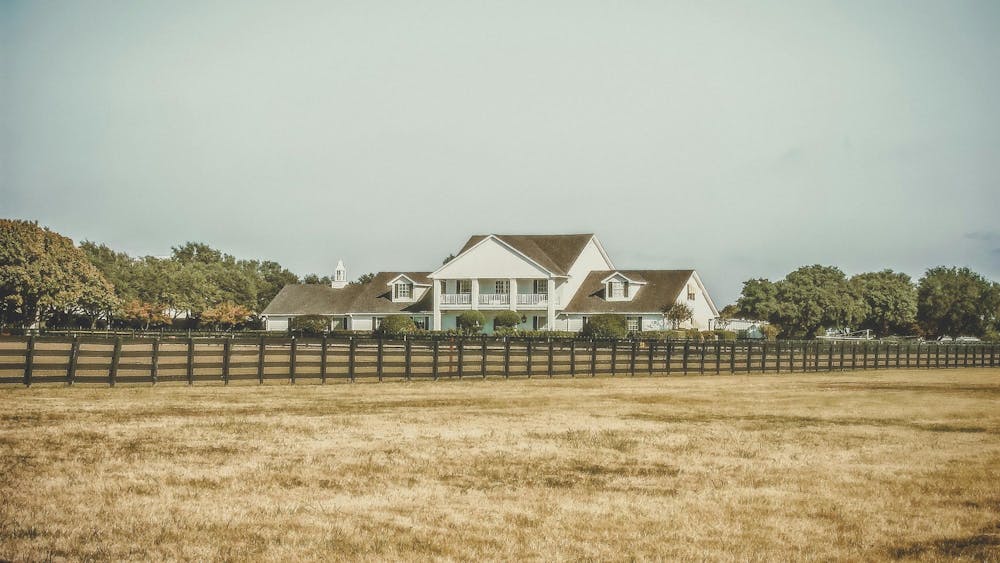The masculine urge to drop everything, move out west, and live off the grid for the remainder of one’s life has been one of my intrusive masculine thoughts. It commonly occurs to me in a variety of settings and situations, and there is certainly something to be said about this. As for the nature of such an idea or masculine urges writ large, I argue that they are obviously irrational but also distinctly rational at the same time. The very existence of ridiculous masculine urges points toward an underlying issue with men and serves as a possible indictment of how they are leading their lives. I will begin with explaining a paradigmatic example where this urge occurs to me.
For one, it happens every Tuesday and Thursday from 11 a.m. to 12:15 p.m. in Honors Corporate Finance in DeBartolo 318. My seat is in the first row and positioned right in front of a window that overlooks DeBart’s flat gravel rooftop and the top two floors of Mendoza. Occasionally, I will closely follow the maintenance man with his toolbox as he walks along the overlaid paths toward a big metal box. He will proceed to pull out metal tools to work on this big metal box. Though I do not know what he is doing at all, I am more captivated by him alone than a lesson about discounted cash flows, that is using algebra to manipulate a handful of variables to magically make your firm have a higher value. Moreover, I have the rising suspicion that the work he is doing is perhaps more valuable and more meaningful than what we, financiers, are doing from our air conditioned classroom a story-and-a-half above him. Periodically, my gaze drifts from the scribble-scrabble of millions and V’s with subscripts and cursive R’s on my dimmed screen upward toward the infinite and freedom, life’s blue backdrop stroked with opaque wisps and gleamed with radiating passion.
It is no coincidence that this is the moment when the thought of dropping all the worries and compulsions of this “life” in order to pursue something higher occurs. I realize that the logistics of this idea are completely unrealistic. My knowledge of calculating net present values and Aquinian moral theology, as much as they are attractive to learn, will not grow the crops or rear farm animals. The income from two unpaid internships will not get me far, or anywhere. I — unfortunately — have no “rad trad” wife with ten children named after Catholic saints to help me operate this estate. However, the concept of this idea is distinctly reasonable, to me at least. Why should I choose to live with and for the artificial instead of pursuing that which is true, good and beautiful? Is not the immediacy of this thought sufficient evidence that I am unsatisfied with the false works and empty promises of this life? Why is it mockable and even wrong for me to desire to live in accord with higher principles and purpose beyond what man has pridefully made and impressed upon the minds of men for generations?
Could it be that my life would be more valuable and more meaningful if I were in union with the infinite and freedom and everything that it promises? I argue that every man, no matter his race, creed, tastes or preferences, desires an authenticity of this sort. This is equally a hopeful reality and a sorrowful one. The desire for this authenticity is etched as a hole in the heart of every man; we are unequivocally united in this common journey and destination. Nothing else can truly fill this hole, except the fulfillment of this particular desire. We are much too similar to each other than we presently realize. Moreover, the sorrow arises from the fact that so few of us acknowledge this reality. Much fewer of us commit to embarking on the journey. We are admittedly too preoccupied with the temporal and the superficial. But it is not entirely our doing. There are overwhelming forces and influences that make it more difficult and sometimes impossible to live an authentic life.
I wholeheartedly defend my masculine urge to drop everything, move out west and live off the grid for the remainder of my life. I may disappoint the greedy capitalist system by removing one less victim from a lifetime of monetary extraction. I may upset Notre Dame’s development office, for they will no longer be able to surveil me on LinkedIn with the intention of aggressive panhandling. I will enrage the cubicle workers at the United States’ Internal Revenue Service, who uphold the agency’s mission of armed wealth redistribution. In light of all these disappointments and dangers, I believe my desire to seek that which is true, good and beautiful is in and of itself, true, good and beautiful. No one and no mechanism can tell me otherwise. During our miserable existences entrenched in a culture of relativism, we can believe in and hold dearly onto one radical and unchanging desire: the masculine urge.
Jonah Tran is a sophomore at Notre Dame double majoring in finance and classics with a minor in constitutional studies. He prides himself on sarcasm and his home — the free state of Florida. You can contact Jonah by email at jtran5@nd.edu.
Jonah Tran is a junior at Notre Dame studying finance and classics. He prides himself on sarcasm and never surrendering. You can file complaints to Jonah by email at jtran5@nd.edu.










